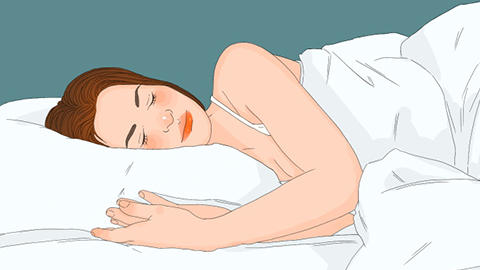Why do I immediately sweat heavily right after waking up in the morning?
Experiencing heavy sweating immediately upon waking in the morning may be caused by a hot and stuffy sleeping environment, emotional fluctuations before sleep, menopausal syndrome, hyperthyroidism, diabetes, or other conditions. This can be improved by adjusting the environment, regulating emotions, medication, and other methods. If excessive sweating occurs frequently or is accompanied by palpitations and fatigue, medical attention should be sought promptly.
1. Hot and Stuffy Sleep Environment: High bedroom temperature or excessively thick bedding can hinder the body's heat dissipation, leading to significant sweating upon waking, without other discomforts. It is recommended to adjust the bedroom temperature to 22–25°C, choose breathable and lightweight bedding, and ensure good indoor air circulation.
2. Emotional Fluctuations Before Sleep: Excessive excitement, anxiety, or tension before bedtime can heighten nervous system activity, causing the sympathetic nervous system to remain active upon waking, resulting in sweating and emotional instability. It is advised to avoid electronic devices one hour before bed and use relaxation techniques such as listening to soft music or soaking feet in warm water to calm the mind.

3. Menopausal Syndrome: In women, declining ovarian function and hormonal changes lead to autonomic nervous system dysfunction, causing hot flashes and excessive sweating upon waking, often accompanied by insomnia and irritability. It is recommended to take medications such as estradiol tablets, triterpenes extract tablets (Ganweisu), or Xiaoyao pills under medical guidance to alleviate symptoms.
4. Hyperthyroidism: Excessive secretion of thyroid hormones accelerates metabolism and increases body heat production, leading to morning sweating, often accompanied by palpitations, hand tremors, and weight loss. It is recommended to take medications such as methimazole tablets, propylthiouracil tablets, or propranolol tablets under medical supervision to manage symptoms.
5. Diabetes: Large blood glucose fluctuations or nocturnal hypoglycemia can stimulate sympathetic nerve activation, resulting in morning sweating, along with thirst, frequent urination, and fatigue. It is recommended to use insulin injection, metformin sustained-release tablets, gliclazide tablets, or other medications under medical guidance to improve symptoms.
Daily care should include maintaining a comfortable and well-ventilated bedroom, avoiding vigorous activities and emotional stress before bedtime, adhering to regular sleep schedules, eating a balanced diet, and engaging in moderate exercise to strengthen overall health.




